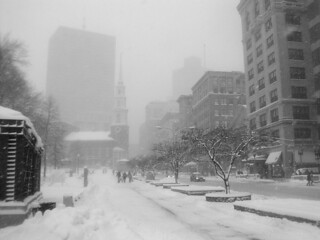Global warming doesn’t mean blizzards are going away – in fact, warmer air and water can help add fuel to extreme winter storms.
We’ll walk through the science in a minute, but first, let’s be honest: It’s not easy to talk climate change in winter. You might be out shoveling and hear a neighbor joke, “So much for global warming, huh?” or see a Facebook post from that conservative cousin taunting, “Ha, where’s your global warming now?”
If you’re feeling bold enough to poke back, science is on your side. Even a quick, friendly reply will do the trick just fine. “If this forecast’s right, more than half of the biggest snowstorms on record at Logan will have come just since 1994 – something’s going on, don’t you think?”
It’s part of a broader trend – fewer routine snowstorms, more monsters. The National Wildlife Federation reports climate change is bringing more oddball winter weather:
Global warming is bringing a clear trend toward heavier precipitation events for the simple reason that warmer air can hold more water. Even with a greater fraction of precipitation falling as rain, many areas are still seeing big and intense snowstorms, especially in the upper Midwest and Northeast, where temperatures typically remain below freezing in winter. At the same time, global warming is shifting storm tracks northward. The last few years have brought several unusually heavy snowstorms as warmer and moister air over southern states has penetrated further north, colliding with bitter cold air masses.
Cold and snow don’t have a direct relationship – it’s not like the colder it gets, the more snow we get. Bitterly cold air can’t hold much moisture – if anything, you get tiny snowflakes. There’s a sweet spot right around the freezing mark for maximum snow (today’s forecast high in Boston: 34).
But warmer air is only one part of the equation – warm water adds fuel to monster storms. Even a recent cold snap has only brought ocean temperatures down to normal in many spots across New England, with water temperatures still well above average off Portland, ME, Newport, RI and New London, CT.
Some of the heaviest snowstorms in America in recent years have come not because it was cold but because it wasn’t nearly cold enough to freeze the Great Lakes, meaning cold air could pick up huge amounts of moisture from the warmer water. A February 2007 10-day lake-effect snowstorm totaled of over 10 feet of snow in western New York state.
More and more scientific evidence is connecting these types of extreme precipitation events to climate change:
- In the last century, we have witnessed a 20 percent increase in the amount of precipitation falling in the heaviest rain and snow events, directly tied to climate disruption. The Northeast has been particularly vulnerable, experiencing a dramatic increase in one-day precipitation extremes during the October to March cold season.
- Coastal flooding has also become more common with climate change, since storm surge now rides higher on seas that have risen due to climate change. A recent report by the Boston Harbor Association warns that many parts of the city are highly vulnerable to flooding.
- Off-shore water temperatures are higher than normal right now, adding to the potential for heavy precipitation by feeding the storm with additional moisture.
While polls show Americans are connecting the dots between global warming and extreme weather, local television viewers will get little help understanding the climate science during the hours of coverage on local stations. Most Boston TV weathermen know that 97% of climate scientists agree the Earth is warming, man-made carbon pollution is to blame, and disastrous weather extremes become the norm, but few say so in their broadcasts, with WPRI’s TJ Del Santo being a notable exception. Meanwhile, colleagues who inexplicably deny the science consensus like NECN’s Tim Kelley and WLNE’s Herb Stevens are happy to say so publicly.
Watch Dr. Amanda Staudt, climate scientist at the National Wildlife Federation, explain how global warming is influencing winter weather:
Note: My day job is with the National Wildlife Federation, but I post here at BlueMassGroup on my own time & my opinions are my own.


We need to move the terminology. Though the issue is the rising global temperature in the aggregate, the term “global warming” leaves us open to those kinds of dumb jokes.
Your stat about snowstorms at Logan is telling. So is the damage wrought by Katrina and Sanda, not to mention Irene in 2011. Storms are becoming more intense year-round and they are not missing our population centers anymore. Fortunately the American public is waking up. Unfortunately, it’s taken this kind of destruction for it to happen.
Guess who?
When I first saw the headline I was thinking…oh no, here we go again…but then your article was right on.
Climate change conveys a sense that this has little to do with us, and climate change fails to convey the degree of destabilization.
Better alternatives?
Climate Crisis
Climate destabilization
Others?